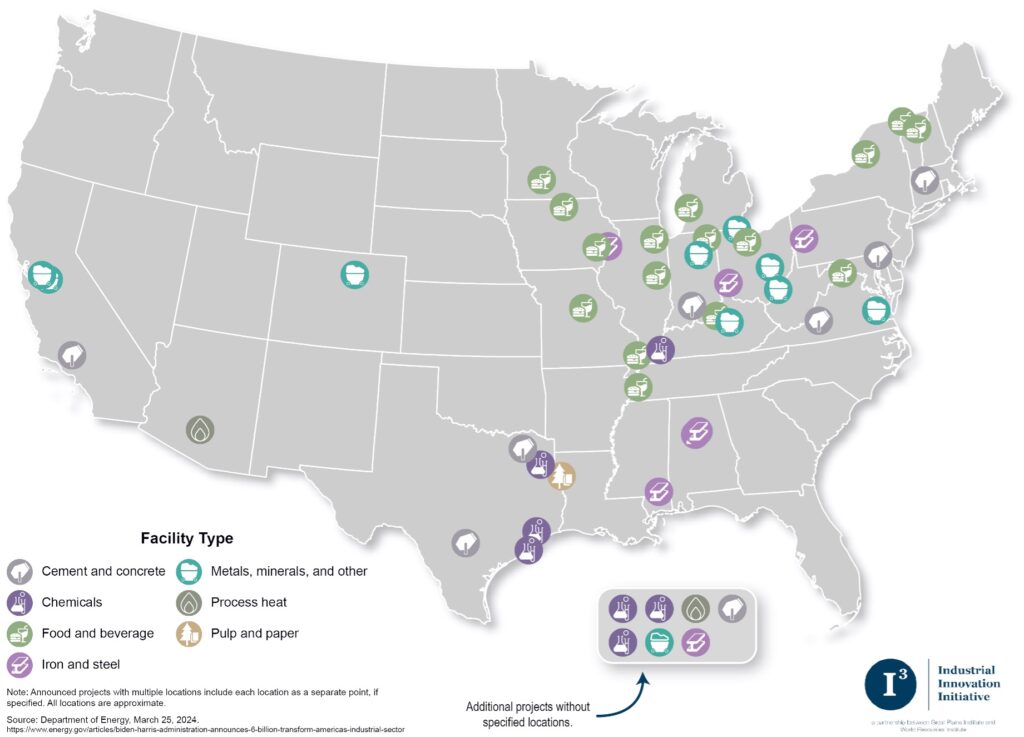On March 25, the Office of Clean Energy Demonstrations (OCED) at the Department of Energy announced that it had selected thirty-three projects to receive up to $6 billion in funding through the Industrial Demonstrations Program. Matching funds provided by recipients will generate a total investment of more than $20 billion in these projects. The awards are intended to decarbonize energy-intensive industries, reduce pollution, and create tens of thousands of new jobs.
This marks the largest single allocation of federal funds for industrial decarbonization in the country’s history, according to DOE Secretary Granholm. The projects are expected to prevent more than 14 million metric tons of carbon dioxide emissions each year, equivalent to the emissions from 3 million gasoline-powered cars. Many of the projects will deploy innovative technologies with the potential for widespread adoption, creating the prospect for significant medium-term emissions reductions. The grants will advance I3’s core goals of strengthening the American manufacturing base, generating well-paying jobs, curbing emissions, and increasing air quality in affected communities.
OCED selected projects in multiple industrial sectors, including cement/concrete, iron/steel, pulp/paper, chemical/refining, and food and beverage.
This is a breakdown of the funding by sector:
| Sector | Funding | # of Projects |
| Cement and concrete | $1.6 billion | 6 |
| Iron and steel | $1.5 billion | 6 |
| Chemicals and refining | $1.3 billion | 7 |
| Aluminum and metals | $900 million | 5 |
| Process Heat | $145 million | 2 |
| Pulp and paper | $46.6 million | 1 |
| Glass | $45 million | 3 |
| Food and beverage | $21 million | 3 |
Project Characteristics
The grants will fund projects in more than 20 states throughout the country. Nine of the thirty-three grants went to projects in Gulf Coast states, including a sustainable ethylene project with participation from I3 member LanzaTech. Eight were awarded to projects in Midwestern states. Several grant recipients will undertake projects at multiple sites. The map below reflects the geographical distribution of the awards.

The dollar value of the awards ranged widely. OCED granted the maximum award of $500 million to five projects. Four projects received awards for less than $50 million. The average grant size was approximately $180 million. More than half the funding went to projects in the iron/steel and cement/concrete sectors.
The I3 Blueprint and the Industrial Demonstrations Program
The projects selected for the Industrial Demonstrations Program will advance several of the key goals of I3’s 2024 Federal Policy Blueprint.
Bolstering Technologies Within and Across Industrial Sectors
OCED awarded funding to projects across various industrial sectors. Successful deployment of new technologies in concrete, steel, and chemical refining can transform production processes within these sectors. Additionally, innovative technologies developed to reduce emissions in one sector can be applied in other sectors.
Industry shares some common challenges across sectors, such as reducing emissions associated with process heat. According to DOE, process heat accounts for nearly a third of the manufacturing sector’s total energy-related emissions. A grant of $145 million will help Skyven Technologies develop steam-generating heat pumps that will replace natural gas boilers in multiple industries. Diageo America Supply will combine heat batteries, onsite renewable energy, and electric boilers to eliminate the use of natural gas-fired heat at its beverage facilities in Kentucky and Illinois.
Demonstrating the Viability of Carbon Capture Technology for Heavy Industry
Meeting midcentury climate goals will require a significant reduction in industrial emissions. Many sectors can electrify production methods, substitute green hydrogen for fossil fuels to generate heat, and deploy new thermal storage technologies to curb emissions. In other cases, such as cement manufacturing, facilities will need to leverage additional technologies, like carbon management, to eliminate all emissions.
The National Cement Company of California project in Lebec, California, provides a model for employing multiple solutions to tackle emissions. National Cement will use a variety of innovative methods to decrease the emissions associated with manufacturing cement, including burning biomass instead of fossil fuels to generate heat and using calcined clay in place of clinker. The company will also capture and store the remaining carbon dioxide emissions that cannot be eliminated through alternative manufacturing processes.
Thousands of miles away in Mitchell, Indiana, Heidelberg Materials US will build one of the world’s most ambitious carbon capture, transport, and storage systems to capture 95 percent of the emissions generated by one of the nation’s largest cement manufacturing facilities. Heidlberg will sequester the captured carbon dioxide in a geologic formation underneath the plant. DOE funded earlier engineering studies that demonstrated the viability of deploying carbon capture technology on the site, underscoring the importance of consistent government support to develop innovative emissions reduction technologies
Market Innovation
I3’s 2024 Federal Policy Blueprint highlights the need for transformational change to industrial processes. Deployment is also critical. Industry needs ongoing government support to test new technologies to determine which approaches will be most impactful. The projects funded by OCED have the potential to radically transform manufacturing processes across multiple industries.
Although funding through OCED’s Industrial Demonstrations Program was awarded to only a few dozen manufacturers, the selectees represent a critical investment in the larger effort to reach midcentury climate goals. Continued federal investment in research and development is essential to drive market innovation and accelerate deployment of new technologies. The United States cannot achieve its midcentury climate goals if it does not significantly decrease industrial emissions, and it cannot slash industrial emissions without deploying diverse technologies with the potential for transformational change.
The announcement of the Industrial Demonstrations Project awards is a watershed moment in the effort to decarbonize the industrial sector, which has traditionally not received the support provided to the transportation and electricity sectors. I3 looks forward to working with recipients to transform and equitably decarbonize the industrial sector.

